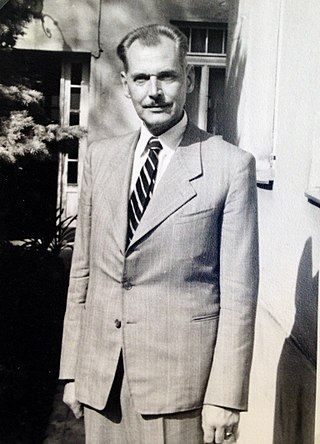Related Research Articles

Johann Joseph Fux was an Austrian composer, music theorist and pedagogue of the late Baroque era. His most enduring work is not a musical composition but his treatise on counterpoint, Gradus ad Parnassum, which has become the single most influential book on the Palestrinian style of Renaissance polyphony.

Egon Joseph Wellesz CBE was an Austrian, later British composer, teacher and musicologist, notable particularly in the field of Byzantine music.
Robert Freiherr von Heine-Geldern, known after 1919 as Robert Heine-Geldern, was a noted Austrian ethnologist, ancient historian, and archaeologist, and a grandnephew of poet Heinrich Heine.
Georg Carl Stetter was an Austrian-German nuclear physicist. Stetter was Director of the Second Physics Institute of the University of Vienna. He was a principal member of the German nuclear energy project, also known as the Uranium Club. In the latter years of World War II, he was also the Director of the Institute for Neutron Research. After the war, he was dismissed from his university positions, and he then became involved in dust protection research. After his dismissal was overturned, he became Director of the First Physics Institute of the University of Vienna, and he began research on aerosols. In 1962, Stetter became a full Member of the Austrian Academy of Sciences. In that same year, the Academy established their Commission for Clean Air, and Stetter served as its chairman until 1985.
"Sei gesegnet ohne Ende", also known as the ″Kernstock-Hymne″, is a German language song that was the national anthem of Austria from 1929 until 1938. Written by Ottokar Kernstock, it was sung to the famous tune of "Gott erhalte Franz den Kaiser" by Joseph Haydn, better known as the tune of the "Deutschlandlied", which since 1922 has been the national anthem of Germany.
Martin Eybl is an Austrian musicologist.

Dirk Rupnow is a German historian. Since 2009 he has taught as Assistant Professor, since 2013 as Associate Professor at the University of Innsbruck, Austria, since 2010 he has been Head of the Institute for Contemporary History there.

Richard Gisser is an Austrian demographer who held leading positions at his country's statistical office until his retirement. He was also the long-time director, then deputy director, of the Vienna Institute of Demography at the Austrian Academy of Sciences.

Richard Henke was an Austrian chemist and inventor.

Ludwig Julius Eisenberg was an Austrian writer and encyclopedist. He wrote a lexicon of stage artists, among other publications.
The Oesterreichisches Musiklexikon is a five-volume music encyclopedia founded by the Austrian Academy of Sciences' Commission for Music Research. It was officially launched on 19 May 2002 with a concert in the main broadcasting hall of Österreichischer Rundfunk (ORF) in Vienna.
Werner Resel is a German cellist. From 1987 to 1997 he was chairman of the Vienna Philharmonic.
Andre Gingrich is an Austrian ethnologist and anthropologist, member of the Austrian Academy of Sciences, director of the Institute for Social Anthropology of the Austrian Academy of Sciences, and retired professor at the University of Vienna.
Gösta Neuwirth is an Austrian musicologist, composer and academic teacher. He studied in Vienna and Berlin, where he wrote a dissertation on harmony in Franz Schreker's Der ferne Klang. He has taught at universities and music schools including the Musikhochschule Graz, University of Graz, Universität der Künste Berlin and University of Freiburg. His compositions include a string quartet and a chamber opera.
Armin Suppan is an Austrian brass musician and composer.
Wolfgang Suppan was an Austrian musicologist. He is the father of the wind musician and composer Armin Suppan.
Liselotte Maikl was an Austrian soprano and ballet dancer.
Marianne Schmidl was first woman to graduate with a doctorate in ethnology from the University of Vienna. An Austrian ethnologist, teacher, librarian and art collector, Schmidl was plundered and murdered in the Holocaust by the Nazis because of her Jewish origins.
Otto Biba is an Austrian musicologist and archive director of the Gesellschaft der Musikfreunde in Vienna.
References
- ↑ Alexander Rausch on Österreichische Akademie des Wissenschaften
- ↑ Opusculum de musica ex traditione Iohannis Hollandrini on Google Books
- ↑ Die Musiktraktate des Abtes Bern von Reichenau: Edition und Interpretation on Google Books
- ↑ Das spätmittelalterliche Choraltraktat aus der Kartause Gaming (Niederösterreich): Einführung und Edition on Google Books
- ↑ Ausgewählte mittelalterliche Musikfragmente der Österreichischen Nationalbibliothek Wien on Google Books
- ↑ Musikalische Repertoires in Zentraleuropa (1420–1450): Prozesse & Praktiken on Google Books
- ↑ Giunone placata Fux WV II.2.19 (K 316) on Google Books